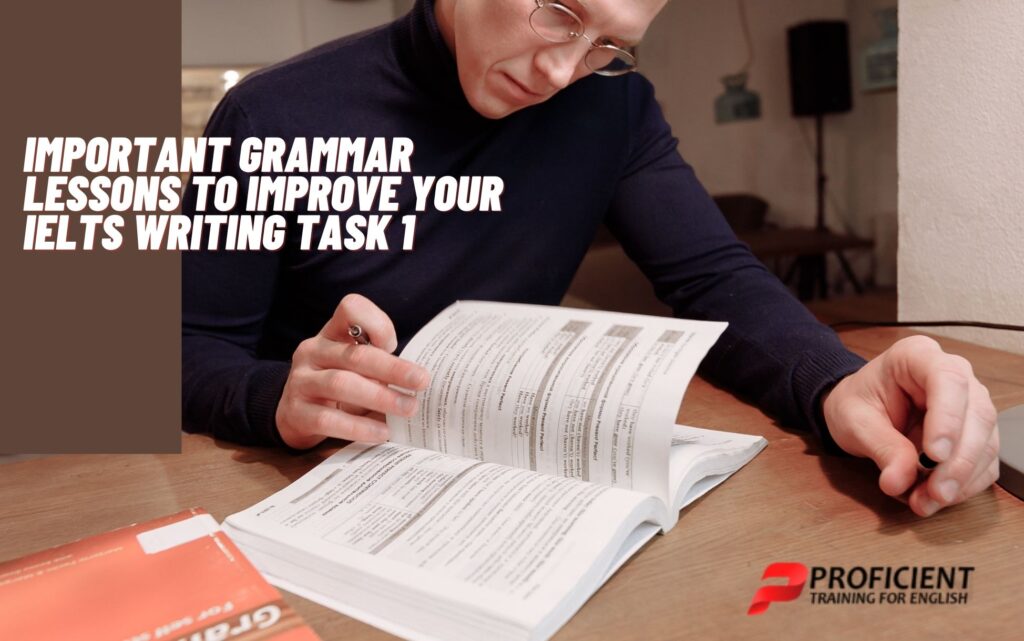Writing task 1 requires you to describe a diagram, chart, pie diagram, process or graph in 150 words. Not only your task is to identify critical information but it’s also to utilize accurate grammar for IELTS. Here’s where you need to understand how the IELTS Writing grammar score works, and how to improve it.
In other words, writing task 1 is referred to as 3Ts:
- Tough as assessing the given diagram and putting every important information together is not a cup of everyone’s tea
- Tricky since you cannot afford to make silly mistakes in grammar, sentence formation or vocabulary while gathering vital information
- Time incentive for the limitation of 20 minutes-limit that should not be ideally crossed.
Grammar has a contribution of 25% in each one of the sections in IELTS including writing task 1. For those who wish to secure band 7 or more in IELTS, grammar should be nothing less than your forte. It’s an integral and inescapable part of both IELTS and professional life in general.
With that being said, let’s look at the must-have lessons to improve grammar for IELTS.
1. PASSIVE VOICE
In IELTS writing task 1 use of passive voice is almost bound to happen. IELTS writing task 1 may require you to explain a process, especially a man-made process. In this case, the use of passive voice is (almost always) expected.
Even though writing in active voice is relatively easier than using passive voice, it’s as important to master both of them.
Active voice elucidates the subject performing the action of a noun (e.g., she watched TV).
On the flip side, passive voice highlights the thing/person receiving the action as a subject. (e.g., TV was watched)
Complications in passive voice arise and even get tangled with larger sentences making it a must-learn lesson to get started with grammar for IELTS.
2. COMPLEX SENTENCES
Grammar for complex sentences is crucial for both range and accuracy and grammar for IELTS. Your writing should be an appropriate mix of both complex and simple sentences.
Although little tricky, complex sentences are categorized into three types:
- Adverbial clauses: They join two sentences and usually aim to answer questions like why? when? how? where?
Example: Although her parents weren’t home, she forgot to bring her house keys.
- Relative clauses: They too connect two sentences but usually give more information about the noun. They are used through words such as, that, where, which, who.
Example: Mr. Jones, who was the manager of the hotel, handled the issue cautiously.
- Noun clauses: Although not very different from relative clauses, noun clauses are used after a verb. They usually answer the questions like who? And what?
Examples: I believe, using artificial intelligence instead of human force should have limitations.
Here, the noun clause is written after the noun “believe”.
We have taken a very brief view of these types. They can be studied in incredible depth and complexity. All of the three clauses mentioned above can have their own exclusive lessons.
3. SUBJECT-VERB AGREEMENT
It’s extremely important for your writing (and even speaking) to have your verb agreeing with your subject.
It’s a very common and noticeable mistake. It doesn’t take much effort for a trained examiner to spot a mistake in subject-verb agreement.
Incorrect sentence: It’s a common misconception that if you don’t performed well in high school your career will not be very bright.
Correct Sentence: It’s a common misconception that if you don’t perform well in high school your career will not be very bright.
Besides this, you can have ample practice from different grammar reference books, and take mock IELTS writing task tests to sharpen your grammar skills. Memorising vocabulary routinely and learning grammar in context to a topic should help significantly. Finally we all need a source of constant feedback to improve our grammatical accuracy.
Until we don’t really know when and where we have made a mistake, we won’t find a way to correct it. Our PTE experts involve each student and give one on one feedback and show you the mistakes. Going further our team explains the reason why such mistakes are to be avoided and how to strategically bypass these mistakes to lift up your scores.
